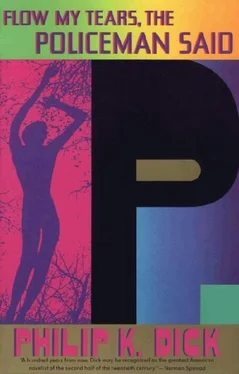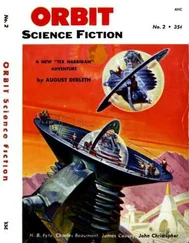Both of them stayed silent for a time.
“But finally,” Ruth said, clearing her throat, “the grief goes away and you phase back into this world. Without him.”
“And you can accept that.”
“What the hell choice is there? You cry, you continue to cry, because you don’t ever completely come back from where you went with him—a fragment broken off your pulsing, pumping heart is there still. A nick out of it. A cut that never heals. And if, when it happens to you over and over again in life, too much of your heart does finally go away, then you can’t feel grief any more. And then you yourself are ready to die. You’ll walk up the inclined ladder and someone else will remain behind grieving for you.”
“There are no cuts in my heart,” Jason said.
“If you split now,” Ruth said huskily, but with composure unusual for her, “that’s the way it’ll be for me right then and there.”
“I’ll stay until tomorrow,” he said. It would take at least until then for the pol lab to discern the spuriousness of his ID cards.
Did Kathy save me? he wondered. Or destroy me? He really did not know. Kathy, he thought, who used me, who at nineteen knows more than you and I put together. More than we will find out in the totality of our lives, all the way to the graveyard.
Like a good encounter-group leader she had torn him down—for what? To rebuild him again, stronger than before? He doubted it. But it remained a possibility. It should not be forgotten. He felt toward Kathy a certain strange cynical trust, both absolute and unconvincing; one half of his brain saw her as reliable beyond the power of the telling of it, and the other half saw her as debased, for sale, and fucking up right and left. He could not put it together into one view. The two images of Kathy remained superimposed in his head.
Maybe I can resolve my parallel conceptions of Kathy before I leave here, he thought. Before morning. But maybe he could stay even one day after that … it would be stretching it, however. How good really are the police? he asked himself. They managed to get my name wrong; they pulled the wrong file on me. Isn’t it possible they’ll fuck up all down the line? Maybe. But maybe not.
He had mutually opposing conceptions of the police, too. And could not resolve those either. And so, like a rabbit, like Emily Fusselman’s rabbit, froze where he was. Hoping as he did so that everyone understood the rules: you do not destroy a creature that does not know what to do.
The four gray-wrapped pols clustered in the light of the candlelike outdoor fixture made of black iron and cone of perpetual fake flame flickering in the night dark.
“Just two left,” the corporal said almost soundlessly; he let his fingers speak for him as he drew them across the rental lists. “A Mrs. Ruth Gomen in two eleven and an Allen Mufi in two twelve. Which’ll we hit first?”
“The Mufi man’s,” one of the uniformed officers said; he smacked his plastic and shot nightstick against his fingers, eager in the dim light to finish it up, now that the end had at last come into sight.
“Two twelve it is,” the corporal said, and reached to stroke the door chimes. But then it occurred to him to try the doorknob.
Good. One chance out of several, a minor possibility but suddenly, usefully true. The door was unlocked. He signaled silence, grinned briefly, then pushed the door open.
They saw into a dark living room with empty and nearly empty drink glasses placed here and there, some on the floor. And a great variety of ashtrays overfilled with crushed cigarette packages and ground-out butts.
A cigarette party, the corporal decided. Broken up, now. Everyone went home. With the exception perhaps of Mr. Mufi.
He entered, shone his light here and there, shone it at last toward the far door leading deeper into the over-priced apartment. No sound. No motion. Except the dim, distant, muted chatter of a radio talk show at minimal volume.
He trod across the wall-to-wall carpet, which depicted in gold Richard M. Nixon’s final ascent into heaven amid joyous singing above and wails of misery below. At the far door he trod on God, who was smiling a lot as He received his Second Only Begotten Son back into His bosom, and pushed open the bedroom door.
In the big double bed, pulpy-soft, a man asleep, shoulders and arms bare. His clothes heaped on a handy chair. Mr. Allen Mufi, of course. Safe and home in his own private double bed. But—Mr. Mufi was not alone in his very own private bed. Involved with the pastel sheets and blankets a second indistinct shape lay curled up, asleep. Mrs. Mufi, the corporal thought, and shone his light toward her, with mannish curiosity.
All at once Allen Mufi—assuming it was he—stirred. He opened his eyes. And instantly sat bolt upright, staring fixedly at the pols. At the light of the flashlight.
“What?” he said, and he rasped with fear, a deep, convulsive release of shaking breath. “No,” Mufi said, and then snatched for some object on the table beside his bed; he dove into the darkness, white and hairy and naked, for something invisible but precious to him. Desperately. He sat back up then, panting, clutching it. A pair of scissors.
“What’s that for?” the corporal asked, shining the light into the metal of the scissors.
“I’ll kill myself,” Mufi said. “If you don’t go away and—leave us alone.” He stuck the closed blades of the scissors against his hair-darkened chest, near his heart.
“Then it isn’t Mrs. Mufi,” the corporal said. He returned the circle of light to the other, huddled up, sheet-covered shape. “A wham-bam-thank-you-ma’am one-time gangbang? Turning your foxy apartment into a motel room?” The corporal walked to the bed, took hold of the top sheet and blankets, then yanked them back.
In the bed beside Mr. Mufi lay a boy, slender, young, naked, with long golden hair.
“I’ll be darned,” the corporal said.
One of his men said, “I’ve got the scissors.” He tossed them onto the floor by the corporal’s right foot.
To Mr. Mufi, who sat trembling and panting, his eyes startled with terror, the corporal said, “How old is this boy?”
The boy had awakened now; he gazed fixedly up but did not stir. No expression appeared on his soft, vaguely formed face.
“Thirteen,” Mr. Mufi said croakingly, almost pleadingly. “Legal age of consent.”
To the boy the corporal said, “Can you prove it?” He felt intense revulsion now. Acute physical revulsion, making him want to barf. The bed was stained and damp with half-dried sweat and genital secretions.
“ID,” Mufi panted. “In his wallet. In his pants on the chair.”
One of the team of pols said to the corporal, “You mean if this juve’s thirteen there’s no crime involved?”
“Hell,” another pol said indignantly. “It’s obviously a crime, a perverted crime. Let’s run them both in.”
“Wait a minute. Okay?” The corporal found the boy’s pants, rummaged, found the wallet, got it out, inspected the identification. Sure enough. Thirteen years old. He shut the wallet and put it back in the pocket. “No,” he said, still half enjoying the situation, amused by Mufi’s naked shame but becoming each moment more and more revolted by the man’s cowardly horror at being disclosed. “The new revision of the Penal Code, 640.3, has it that twelve is the age of consent for a minor to engage in a sexual act either with another child of either sex or an adult also of either sex but with only one at a time.”
“But it’s goddamn sick,” one of his pols protested.
“That’s your opinion,” Mufi said, more bravely now.
“Why isn’t it a bust, a hell of a big bust?” the pols standing beside him persisted.
Читать дальше









